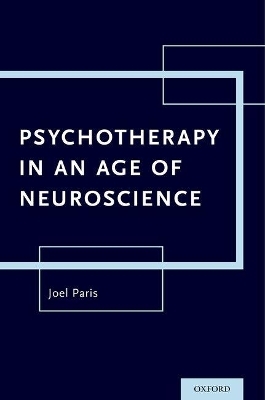
Psychotherapy in An Age of Neuroscience
Seiten
2017
Oxford University Press Inc (Verlag)
978-0-19-060101-0 (ISBN)
Oxford University Press Inc (Verlag)
978-0-19-060101-0 (ISBN)
Psychotherapy In an Age of Neuroscience proposes that psychiatrists can and should continue to use psychotherapy in their practice, and not restrict themselves to medication and brief symptom checks. This is a book that proposes a detailed agenda for redefining the agenda of psychiatry.
Psychotherapy In an Age of Neuroscience is a critique of the neuroscience model that dominates contemporary psychiatric practice. It shows that while the neurosciences have made great advances, this line of research has thus far had little application to the care of patients. It criticizes the over-use of psychopharmacological interventions for common mental disorders such as depression, anxiety, and substance use. It examines why many, if not most, psychiatrists are seeing patients for 15-minute "med checks" oriented to current symptoms and DSM criteria, and are not taking the time to become familiar with the lives of their patients.
The book shows that effective psychotherapeutic interventions are being under-utilized. It proposes that psychiatric practice include the use of psychotherapies that are brief and evidence-based. While most therapy will need to be carried out by psychologists and other mental health professionals, psychiatrists should take on the most complex and difficult cases that require both medication and therapy. By integrating biological and psychosocial interventions, psychiatrists can regain their reputation for breadth of vision and humanism.
Psychotherapy In an Age of Neuroscience is a critique of the neuroscience model that dominates contemporary psychiatric practice. It shows that while the neurosciences have made great advances, this line of research has thus far had little application to the care of patients. It criticizes the over-use of psychopharmacological interventions for common mental disorders such as depression, anxiety, and substance use. It examines why many, if not most, psychiatrists are seeing patients for 15-minute "med checks" oriented to current symptoms and DSM criteria, and are not taking the time to become familiar with the lives of their patients.
The book shows that effective psychotherapeutic interventions are being under-utilized. It proposes that psychiatric practice include the use of psychotherapies that are brief and evidence-based. While most therapy will need to be carried out by psychologists and other mental health professionals, psychiatrists should take on the most complex and difficult cases that require both medication and therapy. By integrating biological and psychosocial interventions, psychiatrists can regain their reputation for breadth of vision and humanism.
Joel Paris is a clinician and researcher who has published over 200 articles and 20 books. He was born in New York City, but has spent his career in Canada. He is a former department chair at McGill University and former editor-in-chief of the Canadian Journal of psychiatry. His main research interest has been in personality disorders.
Introduction
1. Psychiatry: mindless or brainless?
2. The limits of neuroscience
3. Prescribing and overprescribing
4. Thinking Interactively
5. Paradigms and practice
6. What psychiatrists don't know about psychotherapy
7. Integrating psychotherapy into practice
Epilogue: Psychiatry and Humanism
References
| Erscheinungsdatum | 22.06.2017 |
|---|---|
| Verlagsort | New York |
| Sprache | englisch |
| Maße | 206 x 137 mm |
| Gewicht | 249 g |
| Themenwelt | Medizin / Pharmazie ► Medizinische Fachgebiete ► Psychiatrie / Psychotherapie |
| Naturwissenschaften ► Biologie ► Humanbiologie | |
| Naturwissenschaften ► Biologie ► Zoologie | |
| ISBN-10 | 0-19-060101-9 / 0190601019 |
| ISBN-13 | 978-0-19-060101-0 / 9780190601010 |
| Zustand | Neuware |
| Haben Sie eine Frage zum Produkt? |
Mehr entdecken
aus dem Bereich
aus dem Bereich
Buch | Softcover (2023)
Kohlhammer (Verlag)
24,00 €
Menschen mit psychischer Erkrankung wirksam unterstützen
Buch | Hardcover (2023)
Psychiatrie Verlag
35,00 €


